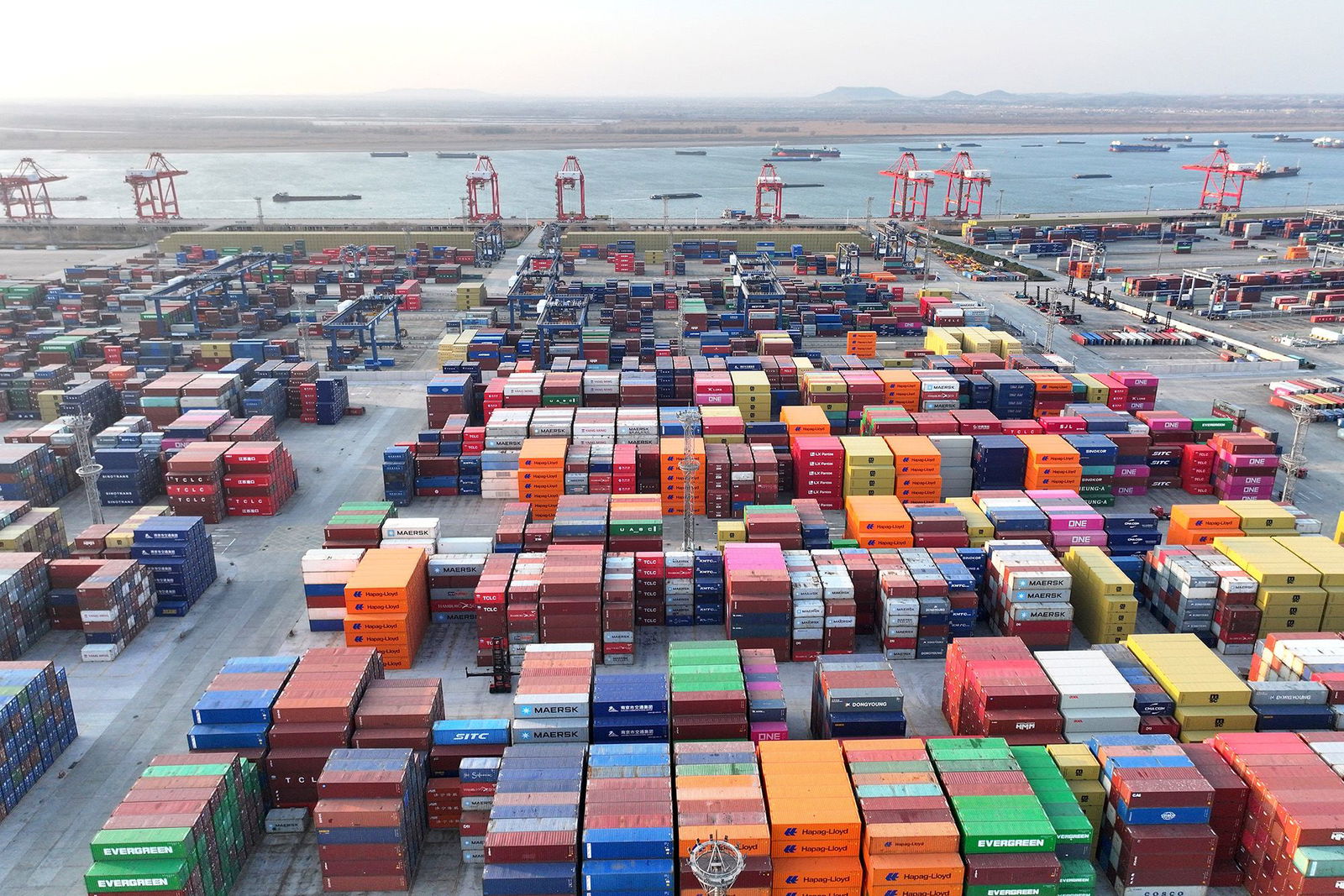China vows to counter Trump’s ‘bullying’ tariffs as global trade war escalates

Containers sit at a port in eastern China's Nanjing on February 4.
By John Liu and Simone McCarthy, CNN
Hong Kong (CNN) — China has vowed to hit back after President Donald Trump announced major new tariffs on its exports to the United States as part of his radical overhaul of a century of American global trade policy.
Trump unveiled 54% tariffs on all Chinese imports into the US Wednesday, in a move poised to push a major reset of relations and escalate a trade war between the world’s two largest economies.
“China firmly opposes this and will resolutely take countermeasures to safeguard its own rights and interests,” China’s Ministry of Commerce said in a statement Thursday morning.
The ministry slammed the move that stands as a centerpiece in Trump’s effort to reshape the rules of international trade as “typical unilateral bullying practice,” while urging the US to cancel the tariffs and “properly resolve differences with its trading partners through equal dialogue.”
“The United States has drawn the so-called ‘reciprocal tariffs’ based on subjective and unilateral assessments, which is inconsistent with international trade rules and seriously damages the legitimate rights and interests of relevant parties,” the statement said.
Trump’s announcement Wednesday adds 34% so-called “reciprocal” tariffs to existing 20% duties on all Chinese imports to the US. Since returning to power in January, Trump had already levied two tranches of 10% additional duties on all Chinese imports, which the White House said was necessary to stem the flow of illicit fentanyl from the country to the US.
Beijing responded to those levies swiftly, but moderately, imposing retaliatory tariffs on a range of US imports including agricultural products and fuel, while taking action against certain American firms and ramping up export controls.
“I have great respect for President Xi (Jinping) of China, great respect for China, but they were taking tremendous advantage of us,” Trump said during his roughly hour-long address in the White House’s Rose Garden on Wednesday. “They understand exactly what’s happening and … they’re going to fight.”
Trump separately announced an additional 10% duties on all imports to the US and a host of country-specific measures that hit Asian countries particularly hard – rattlling markets and businesses across the world.
Ben Schwall, whose supply chain management firm STG Consultants advises companies on their China and Asia strategies, told CNN that industrial supply chains couldn’t keep up with “snap-of-the-finger” policy changes.
“I just wish we had longer vision to know what’s going to happen, what the real plan is,” he said.
‘All the cards have gone flying’
The 54% minimum tariffs that Trump imposed on China are higher than what many analysts had expected and could fundamentally reshape relations – and roughly half a trillion in trade – between the two economies after decades of interdependence.
The challenges are multifold for businesses with supply chains rooted in China, which are now left scrambling as they face not only the unexpectedly high US levies on Chinese imports, but also on other Asian countries.
To skirt existing tariffs, some Chinese and multinational companies have shifted production to other parts of Asia. But Trump’s new tariffs on other Asian nations announced Wednesday will hurt China, too: Vietnam faces levies of 46% and Cambodian goods will be tariffed at 49%.
Schwall said he had worked like a “madman” for the past six months to help clients devise plans to move supply chains out of China, on the assumption that this aligned with the White House’s goals.
But Trump’s immensely high new tariffs on South and Southeast Asian countries like Vietnam and Cambodia, where many companies have shifted at least some of their production from China, had changed the whole calculation, he said.
“Now it’s like someone just flipped over the table. All the cards have gone flying, and I don’t know what to do,” he said, lamenting quickfire US policy changes that make it difficult to plan ahead. “Everyone’s going to just stay in China or move back to China, so really the winner in all of this is China.”
For Greg Mazza, the owner of a lighting company based in Danbury, Connecticut whose products are mainly sourced from China, those dynamics are posing difficult questions about how to guide his business forward.
So far, Mazza had only raised his prices by around 5%, instead of passing on the full cost of tariffs imposed by the Trump administration earlier this year to his customers.
But he thinks “the American consumer is not going to be able to absorb” the economic impact posed by the new broad-based tariffs, while suppliers and business owners that were planning to diversify supply chains elsewhere in Asia are going to struggle.
“People are going to rethink their approach and say, well, ‘I’m either going to deal with China or I’m going to try to start making things in America,’ which I don’t think is viable right now,” he said. “The economy as a whole may suffer enough to where that can’t even happen.”
Nick Marro, principal economist for Asia at the Economist Intelligence Unit, said the new levies may force companies with business in China to reevaluate the practice of keeping operations in the country, even as they enter other markets to diversify their supply chains.
“China is very embedded into global production networks ranging from finished goods to intermediate products to even the sourcing of raw materials, and so this is not going to be an easy or straightforward process,” he said.
The latest measures are “really going to refocus that question on US-China economic decoupling,” he said, adding that extensive US grievances around Beijing’s economic model and policies could also mean the US is not done imposing tariffs on China.
Tit for tat?
The US already had levies on hundreds of billions of dollars worth of Chinese imports into the country.
Many of those duties were holdovers from Trump’s first term in office, when he launched his first trade war with China that resulted in a “phase one” trading agreement that analysts say Beijing never fully implemented. The former Biden administration then ratcheted up tariffs on some additional Chinese goods, including a 100% rate on electric vehicles last year.
This time around, China will likely respond with precision, analysts say.
“Rather than broad retaliation, expect a playbook of calibrated pressure: new tariffs on politically sensitive US exports like agriculture and industrial machinery, expanded use of the ‘Unreliable Entity List’ to target high-profile US firms, and selective export controls on critical inputs,” said Craig Singleton, a senior fellow at the US-based Foundation for Defense of Democracies.
“If (Chinese leader Xi Jinping) refuses to engage, the pressure escalates. If he engages too soon, he risks looking weak. Neither (leader) wants to be seen as folding first, but delay could deepen the standoff,” he added.
The tariffs also come at a challenging time for China’s slowing economy, with officials in recent weeks ramping up efforts to spur weak domestic consumption as they braced for a widening trade war.
“The focus right now really is going to be on whether Chinese officials can successfully rebalance the economy,” said EIU’s Marro. “That’s going to be tough, because with this export shock, we will likely see a depressive impact on production, on sentiments, all things which could discourage Chinese consumers in ways that undermine that rebalancing strategy.”
But as Trump’s sweeping move shakes up US economic relationships with both friend and foe, Beijing may see some silver lining, analysts say.
In recent weeks, Beijing has launched a charm offensive seeking to showcase itself as a champion of global trade and a reliable partner for companies and countries from East Asia to Europe.
With the US becoming an “unpredictable partner,” East Asian economies like Japan, South Korea and Taiwan are likely to reassess their relations with the US, which could potentially benefit China, according to Jason Hsu, a senior fellow at the Hudson Institute, a US think tank, and a former legislator in Taiwan.
“Japan and Korea, the bigger economies, they are still in no position to retaliate against US, but what they could do is to quietly develop a relationship with China to re-engage, to reassess Chinese market opportunities,” he said.
And as Chinese manufacturers may see shrinking paths for their products to enter the US, that will only place more emphasis on Beijing to continue to diversify its own markets.
Trump’s measures announced on Wednesday make for “a pretty severe decoupling between the two countries,” said Wang Dan, director of the Eurasia Group consultancy’s China team.
“But it doesn’t mean that China decouples from the rest of the world … it simply means China’s ultimate destination would have to shift from the US to elsewhere, like Europe, Latin America, Africa, you name it, greater Asia,” she said. “And that is not going to be a short-term phenomenon. It’s going to be a long-term phenomenon.”
The-CNN-Wire
™ & © 2025 Cable News Network, Inc., a Warner Bros. Discovery Company. All rights reserved.
This story has been updated with additional information. CNN’s David Goldman contributed reporting.



